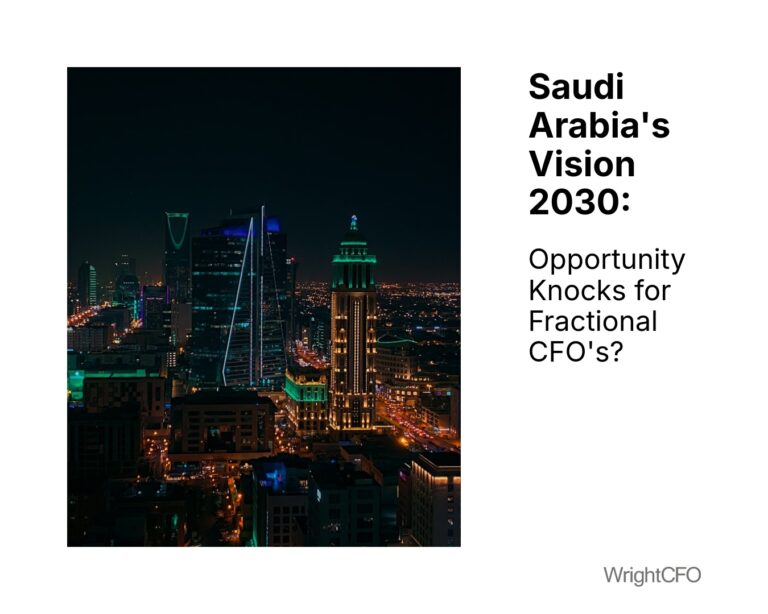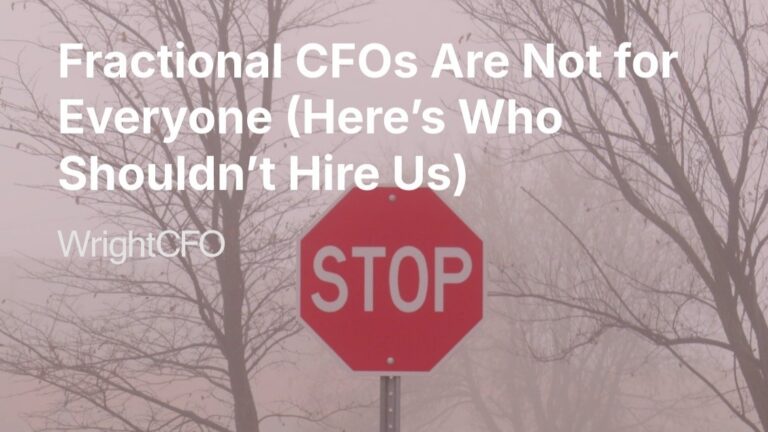The Quiet Revolution: How Fractional CFOs Empower SMEs
Welcome to the latest WrightCFO News!
For decades, the strategic heartbeat of any major corporation—its elite financial guidance—remained an exclusive privilege. Only the largest, most established enterprises could afford the formidable salaries and extensive benefits required to secure a top-tier Chief Financial Officer. This created an unspoken hierarchy: if you were a burgeoning SME, particularly in a dynamic sector like tech, media, creative industries, or the vital not-for-profit world, you were often left to fend for yourself, outmanoeuvred by bigger budgets and the sophisticated financial insights wielded by corporate giants.
This old guard, comfortable in its established dominance, held a quiet, formidable power. Their in-house CFOs, overseeing vast departments, seemed insurmountable. Financial strategy, fundraising acumen, risk mitigation, and sophisticated data analysis were tools reserved for the titans, leaving smaller, innovative players reliant on basic bookkeeping or less strategic financial advice.
But that era, that unspoken rule, is decisively over. The ascendancy of the fractional CFO isn’t merely an evolving trend; it is a profound, disruptive force, a seismic shift that is fundamentally transforming the very fabric of business financial management. We are witnessing a quiet revolution that is putting previously inaccessible strategic firepower directly into the hands of ambitious SMEs, and it’s a development some traditional finance roles in larger firms might very well, and quite rightly, fear.
Levelling the Playing Field: Strategic Insight for Every Ambitious SME
Imagine, for a moment, having immediate, on-demand access to the financial brainpower typically reserved for a FTSE 100 company – the kind of expertise that helps shape multi-million-pound decisions. Now, picture that same expertise, meticulously scaled and precisely tailored to your business’s unique needs, all without the prohibitive financial commitment of a full-time, executive-level salary and associated overheads. This isn’t a hypothetical advantage; it’s the tangible, strategic reality that fractional CFOs deliver.
This model is fundamentally transforming the SME arena. It’s about empowering spirited small and medium-sized enterprises to forge robust financial strategies, meticulously optimise cash flow, and confidently secure crucial funding with the same level of sophistication and foresight previously exclusive to their larger competitors. It’s no longer about simply counting the beans; it’s about strategically growing the entire harvest.
For tech startups, this means expert guidance through complex venture capital rounds, precise burn-rate management, and scalable financial models that attract serious investment. For media companies, it translates into sophisticated project finance, intellectual property valuation, and revenue forecasting in an increasingly fragmented market. Creative industries benefit from proactive cash flow management to weather project-based volatility and ensure sustainable growth. And for not-for-profits, it’s about optimising grant funding, ensuring stringent compliance, and measuring impact with unparalleled financial rigour to maximise their mission.
In essence, it’s about democratising critical financial expertise, ensuring timely and expert insight that actively drives not just survival, but unprecedented growth and long-term resilience. The days when SMEs had to make do with reactive bookkeeping or junior finance staff for lack of better options are firmly behind us.
Curious about how this works in practice for firms like yours? Get a deeper understanding of The Role of a Fractional CFO and explore how we are Empowering SMEs with Top Financial Talent: The Rise of Fractional CFOs.
Outperforming the Goliaths: Real-World Impact on the Bottom Line
We’ve seen it firsthand here at WrightCFO. Our clients, often nimble SMEs bursting with innovation in the tech and creative sectors, are not just surviving in challenging markets; they are genuinely thriving and, crucially, outperforming their larger, often more bureaucratic, rivals. Armed with proactive, strategic financial leadership, these smaller enterprises are making vastly smarter investment decisions, adapting through economic uncertainty with an agility that larger corporations can only dream of, and pinpointing lucrative opportunities their slower, more cumbersome competitors simply miss.
Consider a dynamic tech scale-up that, guided by a fractional CFO, precisely forecasts its cash runway, secures a pivotal Series B round months ahead of schedule, and then uses that capital with such efficiency that it outpaces a larger, publicly traded rival in launching a new product. Or think of a flourishing independent creative studio, who, with expert financial oversight, precisely costs complex projects, optimises its talent spend, and wins bids against corporate agencies because its lean, efficient financial structure allows for more competitive pricing without sacrificing profit. These aren’t isolated incidents; these are the daily realities when top-tier financial expertise becomes an accessible, strategic asset for the ambitious SME.
The true “secret weapon” aspect lies in this: why wouldn’t big businesses want SMEs to have access to this calibre of financial talent? Because it fundamentally disrupts their inherent advantages of scale and vast resources. When a nimble SME can operate with the financial sophistication of a multi-national, the rules of engagement are redrawn. Agility, coupled with astute financial insight, becomes the new competitive currency.
The Seismic Shift: Why This Trend Is Making Waves Across the Finance Profession
This isn’t merely good news for SMEs; it represents a monumental development for the entire finance profession itself. The proliferation of the fractional model is directly challenging the traditional full-time CFO role, prompting a profound re-evaluation of what truly defines strategic financial leadership in the 21st century.
For some, particularly those entrenched in rigid corporate structures, this phenomenon is a significant wake-up call, demanding adaptation. For others, notably forward-thinking finance professionals themselves, it heralds an exciting new frontier. Senior finance executives, often weary of internal politics and singular company focus, are now choosing to leverage their decades of expertise in flexible, impactful ways. They are demonstrating unequivocally that strategic financial leadership can be delivered on a project-by-project, or part-time, basis, offering deep value across multiple, diverse organisations. It forces a poignant question for many in traditional roles: CFOs, Do You Need a Fractional Twin?
This shift also implicitly challenges finance education and recruitment. Are universities adequately preparing the next generation of finance professionals for a world where flexibility, broad industry exposure, and strategic impact are paramount, rather than merely internal reporting? Are large corporations adapting their talent strategies to compete in this evolving landscape, or are they at risk of losing their most agile minds to the fractional movement?
Addressing Misconceptions: The Strength of a Fractional CFO Firm
Naturally, some might harbour reservations about the fractional model. Common concerns include a perceived lack of ‘full-time’ commitment, a deep understanding of unique company cultures, or even data security. These are valid questions, and they are precisely why partnering with a established firm of fractional CFOs like WrightCFO offers a distinct advantage over individual practitioners.
We mitigate these concerns through rigorous onboarding, deep-dive initial assessments, and a commitment to genuine partnership. Our firm comprises seasoned fractional CFOs, meaning you benefit from not just one expert, but the collective intelligence and diverse industry experience of an entire team. Our specialisation in tech, media, creative, and not-for-profit sectors means we truly understand the nuances, challenges, and opportunities specific to your business. We employ robust processes and cutting-edge security protocols to ensure your data is always safe, and our collaborative approach ensures a seamless integration into your team’s culture.
We’re not just offering an outsourced service; we’re providing a strategic partnership built on shared goals and a deep understanding of what drives sustainable financial health and growth. We are proud to be at the forefront of this evolution, honoured to be recognised among the top firms embracing this model. Read more about why WrightCFO is making such an impact: WrightCFO Honoured As A Top 5 UK Fractional CFO Firm.
What’s your perspective on this quiet revolution?
Do you believe fractional CFOs are truly a disruptive force that will fundamentally alter the traditional finance landscape, or merely a beneficial evolution? Are larger firms genuinely unprepared for this shift, or are they already adapting their strategies to counter this new, agile competition? We invite your honest thoughts and experiences. Share your insights in the comments below!
This article was originally published here on LinkedIn on July 16th, 2025.










